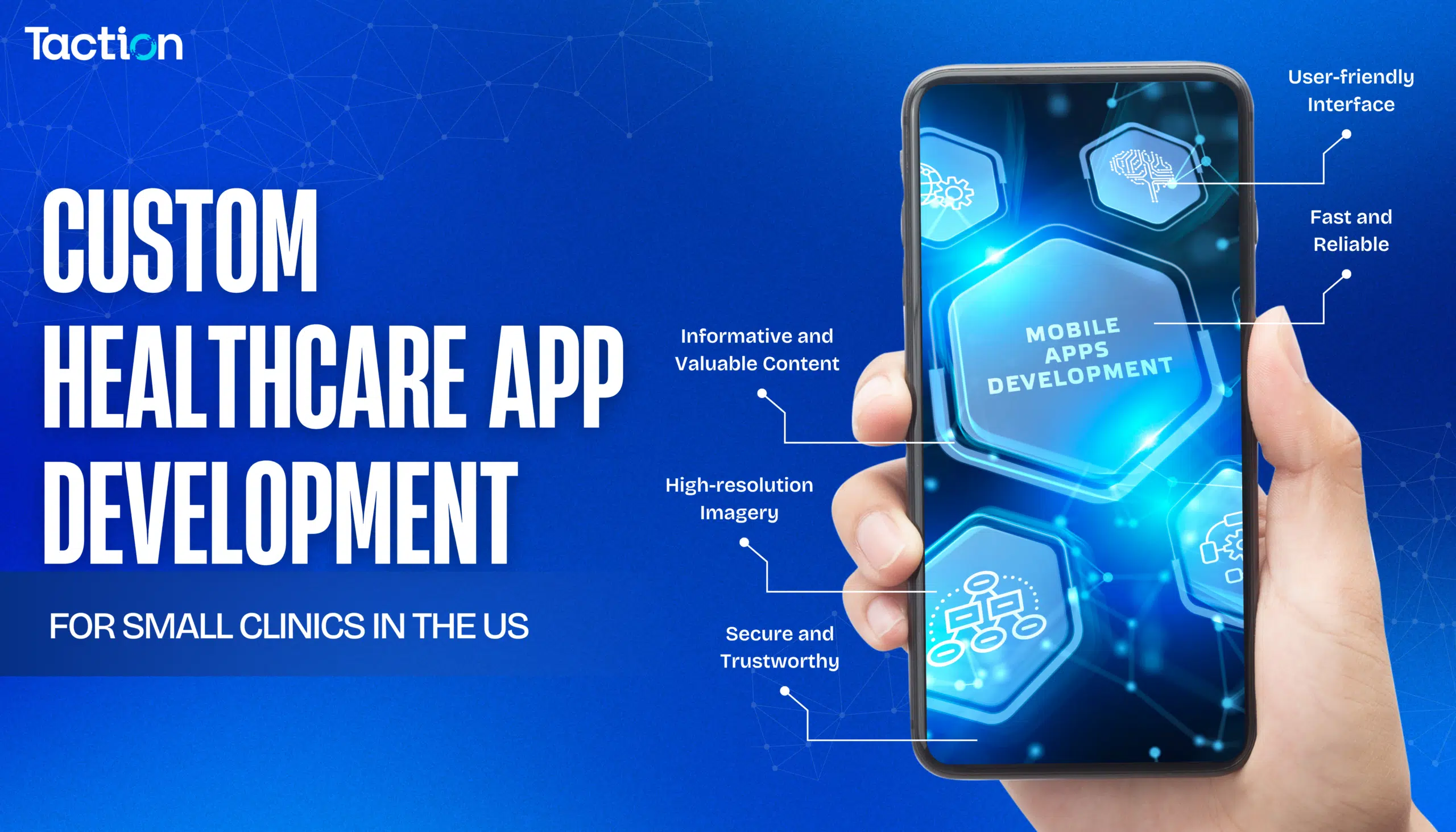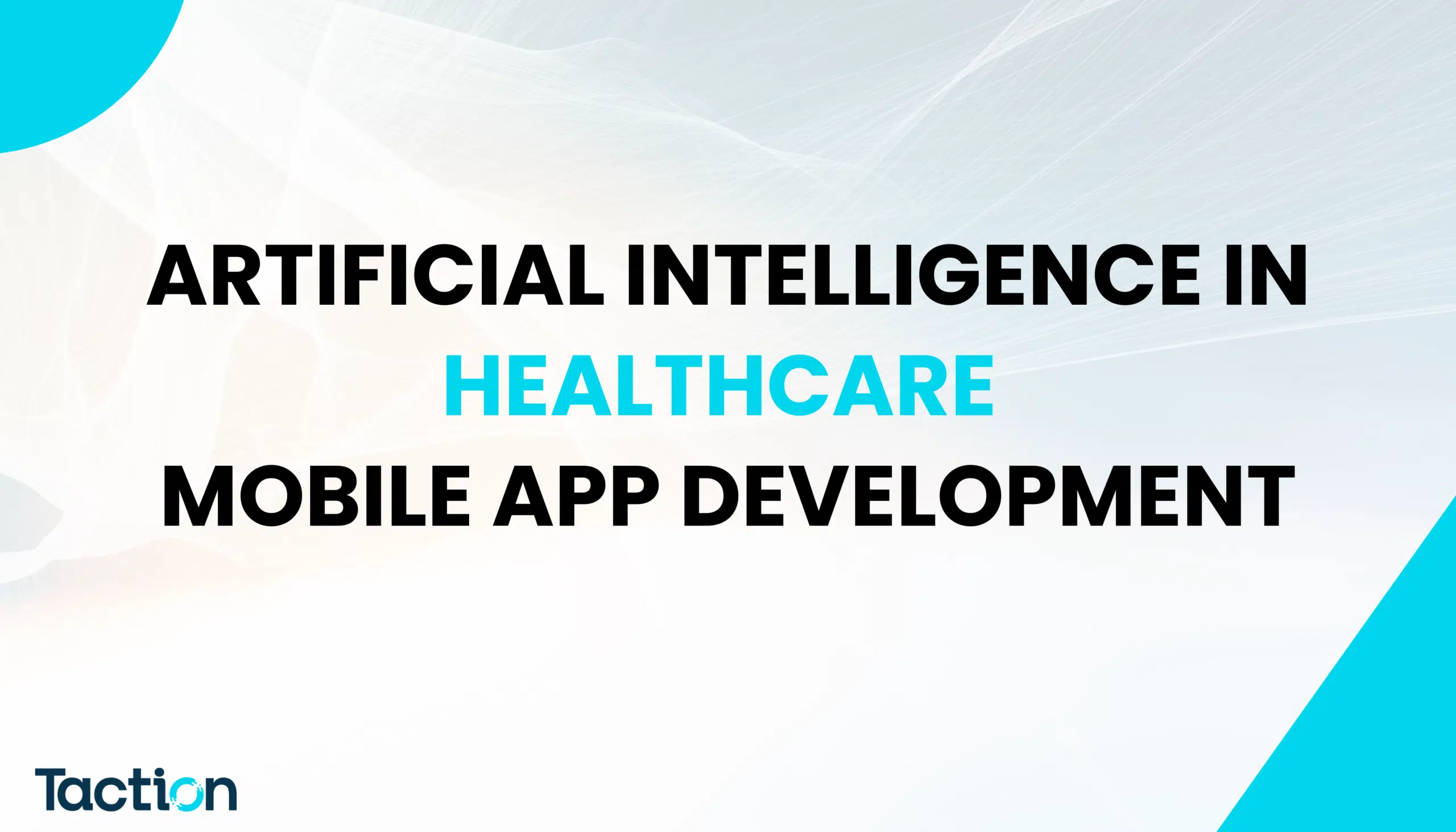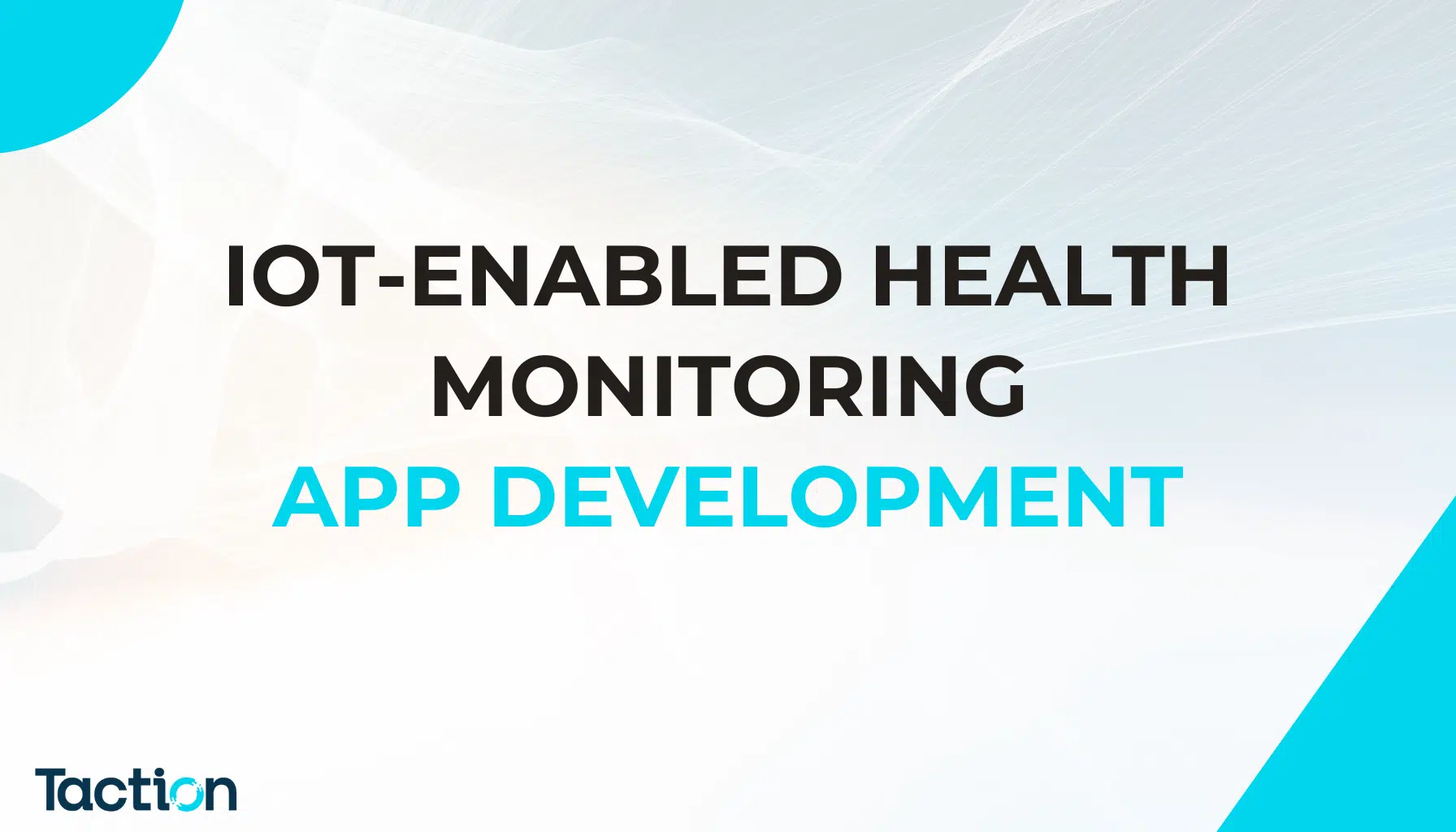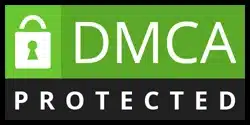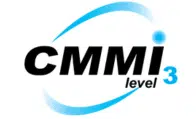Custom Healthcare App Development for Small Clinics in the US
Small clinics in the United States often face challenges such as limited resources, manual workflows, and growing patient demands. Custom healthcare app development offers a game-changing solution tailored to meet these specific needs. By incorporating features like appointment scheduling, patient management, EHR integration, and secure telemedicine options, these apps empower small clinics to improve efficiency, enhance patient care, and stay compliant with regulations like HIPAA.
Unlike off-the-shelf solutions, custom healthcare apps are designed with the unique workflows of small clinics in mind. They address key operational challenges while offering scalability for future growth. Moreover, emerging technologies such as AI, IoT, and blockchain further enhance the potential of these apps, ensuring they remain relevant and impactful in a rapidly evolving healthcare landscape.
Taction Software specializes in delivering custom healthcare app development for small clinics in the US, offering tailored solutions that streamline operations, boost patient satisfaction, and drive long-term success. Let us help your clinic embrace the digital transformation and thrive in today’s competitive healthcare environment.
Why Small Clinics in the US Need Custom Healthcare Apps
In the competitive healthcare landscape, small clinics often struggle to keep up with the growing demands of patients and the complexities of administrative tasks. Custom healthcare apps provide tailored solutions that address these unique challenges, empowering small clinics to thrive in a digital-first world.
Challenges Faced by Small Clinics Without Technology
Small clinics without modern technological support face significant obstacles that can hinder their growth and efficiency. Manual processes for appointment scheduling and patient record management often lead to errors and inefficiencies. Communication gaps between patients and staff can result in poor patient satisfaction. Additionally, the lack of real-time data access and analytics makes it challenging to make informed decisions. Compounding these issues, compliance with strict regulations like HIPAA becomes more difficult without robust digital tools to safeguard sensitive patient data.
The Role of Custom Apps in Overcoming These Challenges
Custom healthcare apps are designed specifically for small clinics to address these pain points. These apps automate administrative workflows, such as scheduling and billing, reducing the likelihood of errors and freeing up staff to focus on patient care. They also enable seamless communication between clinics and patients through secure messaging and notifications, improving engagement and satisfaction. Features like real-time data tracking and reporting allow clinics to make data-driven decisions, ensuring better resource allocation and patient outcomes. Furthermore, custom apps are built with HIPAA-compliant frameworks, ensuring the highest standards of data security and regulatory adherence.
By investing in custom healthcare apps, small clinics can not only overcome operational inefficiencies but also enhance the quality of care they provide, ensuring long-term success in a competitive healthcare environment.
Key Features of Custom Healthcare Apps for Small Clinics
Custom healthcare apps for small clinics are designed to address their specific operational needs, enhance patient care, and ensure regulatory compliance. These apps are equipped with a variety of features that streamline processes and create a seamless healthcare experience for both patients and providers. Below are the key features that make custom apps indispensable for small clinics.
Appointment Scheduling and Patient Management
Efficient appointment scheduling is critical for small clinics to optimize their resources and reduce patient wait times. Custom healthcare apps allow clinics to offer online booking options, automated reminders, and real-time availability updates. These features minimize scheduling conflicts and no-shows, saving time for both staff and patients. Patient management tools also enable clinics to store and organize patient profiles, medical histories, and visit records in a centralized system, ensuring quick and easy access for healthcare providers.
Electronic Health Records (EHR) Integration
Integrating electronic health records into custom healthcare apps provides a unified platform for managing patient data. This feature eliminates the need for manual record-keeping and ensures accurate, up-to-date information at all times. With EHR integration, small clinics can streamline workflows, reduce paperwork, and improve collaboration among healthcare providers. It also enhances decision-making by giving clinicians instant access to patient histories, lab results, and treatment plans.
Secure Communication Channels for Patient Interaction
Custom apps provide HIPAA-compliant secure communication channels that facilitate seamless interaction between patients and clinics. Features such as in-app messaging, email notifications, and video conferencing ensure that patients can easily reach out to their healthcare providers. These tools enhance patient engagement and satisfaction while maintaining the confidentiality of sensitive medical information.
Telemedicine Features for Remote Consultations
Telemedicine has become a cornerstone of modern healthcare, and small clinics can benefit significantly from incorporating this feature into their custom apps. Telemedicine enables clinics to offer remote consultations through video calls, making healthcare accessible to patients who cannot visit in person. This feature is especially valuable for managing follow-ups, chronic conditions, or rural patients who face geographical barriers. Telemedicine not only improves patient convenience but also expands the clinic’s reach, enhancing its service offerings.
By incorporating these key features, custom healthcare apps transform the way small clinics operate, empowering them to deliver efficient, patient-centered care while remaining competitive in the digital healthcare landscape.
Benefits of Custom Healthcare Apps for Small Clinics
Custom healthcare apps offer transformative benefits that address the specific needs of small clinics, enabling them to operate more efficiently and provide superior patient care. These apps bridge the gap between advanced healthcare technology and accessible, practical solutions for clinics with limited resources. Here’s how they can make a difference:
Streamlining Daily Operations
Managing daily operations manually can be time-consuming and error-prone. Custom healthcare apps automate critical tasks like appointment scheduling, billing, and inventory management, freeing up staff to focus on patient care. Features such as real-time updates, workflow automation, and analytics tools allow clinics to operate more efficiently, reducing delays and improving overall productivity. These operational efficiencies not only save time but also help clinics manage resources more effectively, leading to cost savings.
Enhancing Patient Engagement and Satisfaction
Patient engagement is key to the success of any healthcare practice, and custom apps provide tools that enhance the patient experience. Features like online appointment booking, personalized notifications, and access to medical records empower patients to take an active role in their healthcare journey. Secure communication channels allow for seamless interaction with providers, increasing trust and satisfaction. Telemedicine options further enhance convenience by making healthcare accessible from the comfort of a patient’s home, particularly for follow-ups or routine check-ins.
Improving Data Security and Compliance
In a landscape where data breaches and stringent regulations like HIPAA are pressing concerns, small clinics must prioritize data security. Custom healthcare apps are designed with robust security measures, including encryption and secure authentication protocols, to protect sensitive patient information. Additionally, these apps ensure compliance with industry standards, reducing the risk of legal issues and building trust with patients. By safeguarding data and maintaining regulatory compliance, custom apps provide peace of mind for both clinics and their patients.
Custom healthcare apps not only simplify operations but also enhance patient experiences and ensure robust data protection, making them an essential tool for small clinics aiming to thrive in today’s digital healthcare environment.
How Custom Healthcare App Development Differs from Off-the-Shelf Solutions
When it comes to healthcare technology, small clinics often face the challenge of choosing between off-the-shelf solutions and custom app development. While both options aim to improve operations and patient care, custom healthcare app development offers distinct advantages tailored to the unique needs of small clinics. Here’s how custom solutions stand out:
Tailored Solutions for Unique Clinic Needs
Off-the-shelf solutions are designed to cater to a wide range of users, often resulting in a one-size-fits-all approach that includes unnecessary features or lacks critical functionalities for small clinics. Custom healthcare apps, on the other hand, are developed specifically to address the unique workflows and requirements of individual clinics. Whether it’s integrating specific EHR systems, creating bespoke appointment scheduling tools, or building features for niche services, custom apps ensure every aspect of the clinic’s operations is optimized. This level of personalization enhances efficiency and ensures the app aligns perfectly with the clinic’s goals and processes.
Scalability for Future Growth
Off-the-shelf apps often lack the flexibility to adapt as a clinic grows or as industry standards evolve. Custom healthcare apps are built with scalability in mind, allowing clinics to add new features, integrate emerging technologies, or expand functionalities as their needs change. This forward-thinking approach ensures the app remains relevant and valuable over time. Additionally, custom apps can accommodate the increasing demands of patient care, data management, and compliance, making them a future-proof investment for clinics looking to grow their operations.
By offering tailored solutions and long-term scalability, custom healthcare app development empowers small clinics to operate efficiently, meet evolving patient expectations, and remain competitive in a dynamic healthcare environment.
Steps to Develop a Custom Healthcare App for Small Clinics
Developing a custom healthcare app for small clinics requires a strategic approach that prioritizes the clinic’s unique needs, user experience, and regulatory compliance. By following a well-defined process, developers can create an app that streamlines operations, enhances patient care, and ensures long-term success. Here are the key steps involved:
Understanding the Clinic’s Specific Requirements
The development process begins with a thorough analysis of the clinic’s specific needs and challenges. This involves consulting with clinic administrators, healthcare providers, and staff to identify pain points and key areas for improvement. Understanding workflows, patient demographics, and desired functionalities—such as appointment scheduling, telemedicine, or EHR integration—lays the foundation for creating a solution that addresses the clinic’s unique requirements. This step also includes assessing technical constraints and setting clear goals for the app.
Designing a User-Friendly Interface
A user-friendly interface is critical for ensuring the app is easy to navigate for both patients and clinic staff. Developers prioritize intuitive design principles, focusing on clean layouts, straightforward navigation, and accessibility features. By creating an interface that simplifies tasks such as booking appointments or accessing patient records, the app enhances user satisfaction and reduces the learning curve. Incorporating feedback from real users during the design phase ensures the app meets their expectations and needs.
Ensuring HIPAA Compliance and Data Security
Compliance with healthcare regulations like HIPAA is non-negotiable in custom healthcare app development. Developers implement robust security measures, including data encryption, secure authentication protocols, and regular security audits, to protect sensitive patient information. These measures ensure the app meets legal standards while safeguarding patient trust. Addressing compliance early in the development process avoids costly revisions and potential legal complications down the line.
Testing, Deployment, and Maintenance
Thorough testing is essential to ensure the app functions flawlessly across different devices and operating systems. This step includes usability testing, performance checks, and security assessments to identify and resolve any issues before deployment. Once the app is ready, it is deployed in a live environment, with developers providing support during the initial rollout to ensure smooth implementation. Post-deployment maintenance is equally important, as it involves regular updates, bug fixes, and feature enhancements to keep the app up-to-date and aligned with evolving clinic needs.
By following these steps, custom healthcare app development delivers a solution tailored to small clinics, helping them overcome operational challenges, improve patient care, and stay competitive in the ever-changing healthcare landscape.
Cost of Developing a Custom Healthcare App for Small Clinics in the US
Investing in a custom healthcare app is a significant decision for small clinics, as it involves upfront costs but offers long-term benefits. Understanding the factors that influence development costs and evaluating the return on investment (ROI) can help clinics make informed choices.
Factors Influencing Development Costs
The cost of developing a custom healthcare app varies based on several factors:
- App Complexity: Apps with advanced features like telemedicine, EHR integration, and AI-powered analytics are more expensive to develop than simpler solutions.
- Customization Level: The more tailored the app is to the clinic’s unique needs, the higher the development cost. However, this ensures the app aligns perfectly with the clinic’s workflows.
- Development Team Expertise: Hiring experienced developers, especially those familiar with healthcare regulations like HIPAA, may increase costs but ensures high-quality outcomes.
- Integration Requirements: Connecting the app with existing systems such as EHR or billing software adds to the complexity and cost of development.
- Security Measures: Incorporating robust data encryption and compliance features is essential for healthcare apps, adding to the overall expense.
- Maintenance and Updates: Post-launch support and updates are necessary for ensuring the app remains functional and secure, which involves additional costs.
Return on Investment (ROI) for Small Clinics
While the initial investment in a custom healthcare app may seem high, the long-term ROI for small clinics can be substantial.
- Operational Efficiency: Automating administrative tasks reduces staff workload, minimizes errors, and improves productivity, leading to cost savings.
- Enhanced Patient Satisfaction: Features like seamless scheduling, telemedicine, and secure communication improve the patient experience, fostering loyalty and retention.
- Revenue Growth: By expanding service offerings (e.g., telehealth) and attracting more patients through better services, clinics can boost their income.
- Regulatory Compliance: A compliant app reduces the risk of legal penalties, ensuring peace of mind for clinic administrators.
In summary, while the cost of developing a custom healthcare app can range from $20,000 to $150,000 or more, the benefits it provides in terms of efficiency, patient engagement, and revenue generation make it a worthwhile investment for small clinics in the US.
Real-Life Success Stories of Small Clinics Adopting Custom Healthcare Apps
The impact of custom healthcare apps on small clinics is best illustrated through real-life success stories. By addressing specific challenges and introducing tailored solutions, these apps have transformed operations and improved patient care. Here are two compelling case studies:
Case Study 1: Streamlining Clinic Operations
A small family clinic in rural Texas struggled with manual appointment scheduling, leading to frequent errors, overbooked slots, and administrative bottlenecks. The implementation of a custom healthcare app revolutionized their operations.
The app featured automated appointment scheduling, patient record management, and billing integration. With real-time updates and reminders, staff workload was reduced by 30%, and patient wait times were cut in half. The app’s analytics tools allowed the clinic to identify peak hours and optimize staff allocation, further improving efficiency. Within six months, the clinic reported a 20% increase in patient satisfaction and a notable reduction in administrative costs.
Case Study 2: Enhancing Patient Experience with Telehealth
A pediatric clinic in New York faced challenges providing accessible care to patients in remote areas. They adopted a custom healthcare app with integrated telehealth features, enabling virtual consultations for routine check-ups and follow-ups.
The app allowed parents to schedule video consultations, access digital prescriptions, and communicate with pediatricians through secure messaging. This eliminated the need for long commutes, saving time and money for families. Within the first year, the clinic saw a 40% increase in patient retention and expanded its services to nearby rural communities. The app also provided a competitive edge by positioning the clinic as a forward-thinking healthcare provider.
These success stories highlight how custom healthcare apps empower small clinics to overcome operational challenges, enhance patient care, and achieve long-term growth in a highly competitive healthcare landscape.
Common Mistakes to Avoid in Custom Healthcare App Development
Developing a custom healthcare app for small clinics requires careful planning and execution. However, common mistakes during the process can lead to suboptimal results, increased costs, or even legal complications. By understanding these pitfalls, clinics can ensure their app meets expectations and remains effective long-term.
Neglecting Compliance and Data Security
One of the most critical mistakes is failing to prioritize compliance with healthcare regulations like HIPAA. Custom apps handle sensitive patient data, and any lapse in security measures can result in data breaches and hefty legal penalties. Neglecting encryption protocols, secure authentication, or regular security audits puts patient trust and the clinic’s reputation at risk. Ensuring compliance from the start, including robust data protection measures, is essential to safeguard sensitive information and maintain legal standards.
Overlooking the Importance of Scalability
Many small clinics focus solely on their immediate needs when developing a custom app, overlooking the importance of scalability. This short-sighted approach can lead to an app that struggles to adapt as the clinic grows or as new technologies emerge. For example, an app designed without considering future integration with telemedicine or advanced analytics may require costly overhauls down the line. Building the app with scalability in mind allows for seamless updates, feature expansions, and compatibility with emerging trends, ensuring the app remains valuable for years to come.
By avoiding these common mistakes, small clinics can develop custom healthcare apps that are secure, compliant, and capable of evolving with their needs, ultimately maximizing the app’s effectiveness and long-term ROI.
Why Choose Taction Software for Custom Healthcare App Development?
Taction Software stands out as a trusted partner for small clinics looking to develop custom healthcare apps. With a deep understanding of the healthcare industry and a commitment to delivering tailored solutions, Taction empowers clinics to optimize operations, enhance patient care, and achieve sustainable growth.
Expertise in Healthcare Technology
Taction Software brings years of experience in developing cutting-edge healthcare solutions, ensuring that every app is built with precision and compliance. Our team is well-versed in industry regulations such as HIPAA, guaranteeing the highest standards of data security and privacy. From telemedicine capabilities to EHR integration, we deliver apps that address the unique needs of small clinics while incorporating the latest advancements in healthcare technology.
Our expertise also extends to designing intuitive, user-friendly interfaces that streamline workflows for clinic staff and provide seamless experiences for patients. Whether you need secure communication channels, appointment management tools, or advanced analytics, we craft solutions that drive efficiency and improve outcomes.
Proven Track Record in Serving Small Clinics
At Taction Software, we specialize in empowering small clinics with custom apps tailored to their specific requirements. Our portfolio includes successful projects where we have helped clinics enhance patient satisfaction, reduce administrative burdens, and boost operational efficiency. From rural practices to urban clinics, our solutions have consistently delivered measurable results.
What sets us apart is our client-centric approach. We collaborate closely with your team to understand your clinic’s challenges and goals, ensuring that the final product aligns perfectly with your vision. Post-deployment, we provide ongoing support and updates to keep your app performing at its best.
By choosing Taction Software, small clinics gain a trusted partner dedicated to helping them thrive in a competitive healthcare landscape. Let us transform your operations with a custom app designed to meet your needs and exceed your expectations
The Future of Healthcare Apps for Small Clinics
The healthcare industry is rapidly evolving, and small clinics are increasingly turning to technology to stay competitive and meet patient expectations. Custom healthcare apps are at the forefront of this transformation, offering solutions that are not only relevant today but also prepared for the future.
Emerging Trends in Healthcare App Development
The future of healthcare apps lies in the integration of advanced technologies such as Artificial Intelligence (AI), Machine Learning (ML), and Internet of Things (IoT). These innovations enable predictive analytics for patient care, wearable device integration for real-time health monitoring, and AI-powered chatbots for 24/7 patient support. Additionally, blockchain technology is being adopted to enhance data security and streamline patient record management. Small clinics that embrace these trends will be better equipped to deliver cutting-edge care and improve operational efficiency.
Long-Term Benefits for Small Clinics
Custom healthcare apps offer significant long-term advantages for small clinics. They enable clinics to remain agile, adapting to changing industry standards and patient demands. By automating workflows, improving patient engagement, and ensuring compliance with regulations, these apps help clinics save time and resources while delivering better care. Moreover, scalable solutions ensure that as clinics grow, their technology evolves with them, reducing the need for costly overhauls in the future.
The future of healthcare apps is bright, and small clinics that invest in custom solutions today will position themselves for sustained success in an increasingly digital healthcare ecosystem.
Conclusion
Custom healthcare apps are revolutionizing the way small clinics operate, providing tailored solutions to address unique challenges, streamline workflows, and enhance patient care. These apps empower clinics to improve efficiency, ensure compliance with regulations, and deliver a seamless patient experience. With features like appointment scheduling, EHR integration, secure communication, and telemedicine, custom apps are invaluable tools for clinics aiming to thrive in today’s competitive healthcare landscape.
Partnering with an experienced provider like Taction Software ensures that your clinic benefits from cutting-edge technology, expert guidance, and a solution designed to meet your specific needs. Our proven track record in healthcare app development makes us the ideal choice for small clinics looking to embrace digital transformation. Contact Taction Software today to create a custom healthcare app that drives growth, improves patient outcomes, and sets your clinic apart.
FAQs About Custom Healthcare App Development for Small Clinics
Custom healthcare app development involves designing and building apps tailored specifically to the unique needs of healthcare providers, such as small clinics, to improve patient care, streamline operations, and ensure compliance with regulations like HIPAA.
Small clinics benefit from custom healthcare apps as they offer features like appointment scheduling, patient management, telemedicine, and EHR integration, all designed to address their specific operational challenges and improve patient satisfaction.
The development timeline depends on the app’s complexity, features, and requirements. On average, it can take anywhere from 3 to 6 months to build a fully functional custom healthcare app.
Essential features include appointment scheduling, patient management, secure messaging, EHR integration, telemedicine capabilities, billing systems, and analytics for decision-making.
Yes, reputable developers ensure that custom healthcare apps adhere to HIPAA compliance to safeguard patient data and maintain legal standards for privacy and security.
The cost varies depending on features, complexity, and development time. On average, it ranges from $20,000 to $150,000. Small clinics can also start with an MVP (Minimum Viable Product) to manage costs.
Yes, custom healthcare apps can be designed to integrate seamlessly with existing EHR systems, ensuring continuity in patient data management and enhancing operational efficiency.
Custom apps are tailored to a clinic’s specific needs, scalable for future growth, and offer better integration and compliance compared to off-the-shelf solutions, which often include unnecessary features or lack adaptability.
Custom apps enhance patient engagement by providing features like easy appointment booking, secure communication, reminders, telehealth services, and access to health records, all of which improve the overall patient experience.
Taction Software specializes in creating tailored solutions for small clinics, ensuring HIPAA compliance, user-friendly designs, and scalable features. With extensive expertise in healthcare app development, Taction Software delivers apps that drive patient satisfaction and clinic efficiency.

